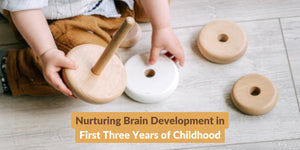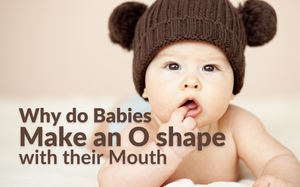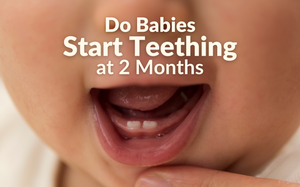Breast milk is recommended by doctors for the first six months of life. After that, semi-solid and solid foods can gradually be introduced, as breastmilk alone won’t fulfil your little one's nutritional needs. When your baby is able to sit up with support, has good head control, and shows signs of a desire to eat other foods, such as leaning forward towards the food, opening the mouth when offered it, etc., they are ready for semi-solid foods.
Self-feeding can help your baby develop independence. Waiting too long before starting solid food for babies can result in poor growth, iron deficiency, anaemia, and feeding problems.
Effective Tips To Teach Your Baby To Feed Themselves (Self Feeding)
When your baby is about nine months of age, they will show interest in self-feeding. They may also be able to eat small amounts by themselves. Few points to keep in mind when your are teaching your baby to self feed:- Make sure to wash your and the baby’s hands before mealtime. Ensure that they are seated comfortably while eating.
- Use utensils with no sharp edges and the ones that will not break.
- By one year, your baby will be able to eat a variety of foods. Encourage self-feeding even if they make a mess. Let the baby decide the quantity and when they want to stop eating. Praise their self-feeding skills and effort whenever you get a chance.
- Allow the baby to sit with the family at mealtimes to observe and learn good eating habits. Talk to them during meals to keep things interesting and hold their attention.
- To avoid choking accidents, keep your attention on your baby. While your baby is eating, avoid distractions such as phones, television, or pets.
- Small pieces of solid food for babies, like cooked veggies, are easy for babies to pick up and chew. The best self-feeding method for babies is to progress from pureed food to mashed food and then to soft food diced into small pieces.
- Small, hard foods (such as nuts and raw vegetables) should be avoided as they can cause choking.
- To understand their preferences, introduce a new food and wait a few days before introducing another. While you continue to feed your baby, give them a small spoon to get used to using it.
- Fruit juices should be avoided because they reduce the baby's intake of breastmilk. After eight months, small amounts of cow's milk can be introduced into your baby's diet.
Using hands and spoons
Initially, your little one will use their fingers to pick up the food. This action helps in the development of their motor skills. By the age of about twelve months, they should be able to easily eat with their hands. Allow your baby to use a spoon while you feed them most of the food when they are about ten months old. A great self feeding method for babies is to provide them with a spoon dipped in phirni or shrikhand. They will have the satisfaction of eating alone when they put this in their mouth.Offer a variety of foods such as fruits, vegetables, and dairy items. Your child can learn to drink from a cup without a lid when they are about nine months old. They will be able to hold a cup using both hands when they are about one year old.
Best Solid Foods for Babies (First Foods)
Common first foods for self-feeding babies include:- Fruits, such as ripe bananas, as well as seasonal fruits.
- Vegetables that have been cooked and mashed, such as carrots, cauliflower, peas, pumpkin, sweet potato, potato, beetroot, and carrots.
- Porridges made with staple cereals like whole wheat flour, rice, suji (semolina), ragi, broken wheat, or millet.
- Chapati that has been soaked in milk, mashed, and strained.
- To make it more energy-dense, add ghee, butter, or oil, along with sugar or jaggery.
- Introduce foods such as sheera, upma, idli, dosa, poha, khichdi, and dhokla gradually.
- Some spices in food are beneficial to health and can be tolerated by babies.
- Water from a spoon or a standard glass.
- Non-vegetarian foods such as eggs, fish, and chicken (depending on the eating habits of the family).
- Avoid foods that are high in sugar, artificial sweeteners, salt, and include monosodium glutamate (ajinomoto). If there is a strong allergy history in the family, avoid nuts and other foods that may cause an allergic reaction.
Self-feeding is an important developmental milestone for a baby. Encourage your toddler to eat with their hands and participate in a variety of activities to entertain them while building their self-feeding skills.
References:
- Better Health Channel. Eating tips for babies [2020].
- Centers for Disease Control and Prevention. Mealtime routines and tips [2020].
- Centers for Disease Control and Prevention. Fingers, spoons, forks, and cups [2020].













LEAVE A COMMENT